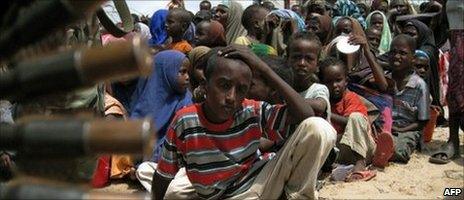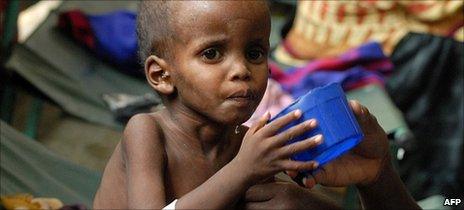Somalia's hungry head for a war zone
- Published
Desperate famine victims are now heading for the capital Mogadishu
You might have thought the seemingly endless conflict for control of Somalia's capital, Mogadishu, would mean it is a place best avoided if you can help it.
But for tens of thousands of Somalis hit by drought and now the threat of widespread famine, that danger is eclipsed by a glimmer of hope - an escape from the hunger.
"With this drought we were hungry at home - no water no food; so we decided to leave the village and head to a camp," said mother-of-five Safia Ali Noor, who caught a lift on the back of a truck for the more than 200km- (125 mile-) journey to Mogadishu.
Her twins, Nasir and Abshir, are desperately in need of help.
They are 12 months old but look as fragile as new-born babies so severe is their malnutrition.
A young woman pushes long sticks into the sandy ground - the frame for a new home that will be draped in cloth or, if she is lucky, a donated plastic sheet.
Badbaado Camp was only opened on 12 July. It is already home to more than 21,000 people.
Cross-fire
One of several camps for internally displaced people in Mogadishu, it lies just 400m from the front line in the conflict between pro-government forces and the Islamist, al-Qaeda-linked insurgents, al-Shabab.
Bullets sometimes hit the camp during cross-fire.
It is protected by soldiers from the transition government - whose uniforms are as diverse as their ages.
One 13 year old held his AK47 assault rifle tightly as he sat in the back of a 4x4.

Somalia has been at war for two decades
At the camp's therapeutic feeding centre you get a picture of just how deep the crisis is.
Twenty years of war followed by prolonged drought have taken their toll.
In the rubble of a once grand but now destroyed home, women queue up cradling their babies.
Well over 1,000 children have been registered as malnourished in this camp in just nine days.
Aid agencies are trying to rescue them, offering the peanut-based Plumpy'nut therapeutic food as well as medicine and vaccines.
"We really need to have enough supplies to provide for these children," said Rozanne Chorlton, Somalia representative for the UN children's agency.
"We need vaccinations and supplementary food; we need clean water and sanitation facilities. Of course fundamentally we need food," she said.
"Many children are getting here too late; many are being referred to the hospital stabilisation centre but those children are already in a very, very bad condition."
Box of cash
A saloon car pulled up.
The boot was flipped open to reveal cardboard boxes full of cash.
Women sat in lines in the sand to receive a thick wad of notes - valued at $3 (£1.80).

Many children look younger than their years because of malnutrition
A gift from the diaspora - but not enough to go round.
The other side of a roll of barbed wire, the men with guns were trying to keep control.
On the wrong side of the wire they were going to have to go without.
On the popular side of the barbed wire sat Ismail Mohamed Ibrahim: 70 years old and totally blind, he queued for some food being cooked in huge metal pots over wood fires - this distribution was a gift from Qatar.
"Nobody could farm anything; so I headed for Mogadishu on foot. It took me a week," he told me.
He had come from a village in Lower Shabelle - often referred to as Somalia's breadbasket but now one of the regions where the UN has declared a famine.
Peering out through the windows of an armoured vehicle full of Burundian peacekeepers, I could see that parts of Mogadishu are full of the hustle and bustle of business.
There are plenty of shops selling colourful cloth, money transfer points, dentists and building materials.
But the landscape is changing as shelters are mushrooming on empty spaces being swallowed up by new camps.
This influx of the hungry and displaced is bound to add new security challenges for those charged with trying to make the capital safe.
Getting the aid to Mogadishu might be a straightforward task compared to accessing the swathe of al-Shabab held territory across southern Somalia - that is where the drought has hit hardest and where the help is needed most.
And with al-Shabab reversing an earlier decision to lift the ban on some international agencies, it looks as though the political fighting will hamper the fight to feed the hungry.
